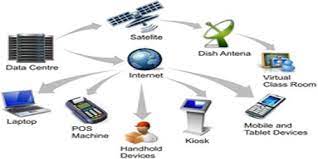A sales CRM (customer relationship management) is a tool for keeping track of all interactions with prospects and customers during the sales process. A CRM could be used by a support team to manage client requests, or by marketing teams to study how customers respond to online ads. When it comes to sales, a CRM is employed to help manage the pipeline. You can safely keep databases of customer information and drive more sales with a sales CRM application. Let’s show you the best free sales CRM Software, tools, and best sales CRM system.
What is Sales CRM Software?
The majority of people think of CRM (customer relationship management) as software or a tool that helps them manage and strengthen their interactions with prospects and customers.
Sales CRM software tools, in essence, make the lead nurturing process easier. Administrative tasks and data management are both automated, allowing you to spend less time entering data and more time cultivating meaningful interactions with prospects.
Sales CRMs can be your one-stop shop for daily tasks. They can connect to your existing tools and communication channels, allowing you to manage all of your responsibilities from a single, centralized location. A sales CRM not only makes accurate, thorough lead information more accessible but also aids in the identification of underlying performance or operational concerns that may be limiting your company’s growth.
Best Sales CRM
CRM entails more than just contacting potential leads. It entails cultivating relationships and fostering loyalty while also maintaining a dynamic database of contact information and client history. The logical next step is to make this information available to collaborative teams and pipe it out to other business software solutions via smart integrations. Here are the best sales CRM software tools that can serve you better.
#1. HubSpot CRM
HubSpot is a well-known CRM company that provides a free sales platform with basic capabilities. It takes care of the fundamentals of the sales process, such as lead management and cross-channel customer contact tracking. You may use Zapier to communicate information between apps like Slack and Google Sheets. With AI assistance, greater prospect analytics, and high-end automation, the premium Sales Hub CRM add-on ups the ante significantly.
Pricing plan:
- HubSpot CRM is available for free and has an unlimited number of users.
- Add-on packages for Marketing Hub, Sales Hub, and Service Hub cost $50 per user/per month, payable monthly.
- HubSpot CMS costs $300 per month and is payable on a monthly basis.
- Monthly billing for the all-inclusive Starter Growth Suite starts at $113 per user/per month.
#2. Zoho CRM
With its easy user interface, customizable modules, automation, and social media tools, Zoho CRM appeal to organizations of all sizes and types. You may use the platform to create workflows, rationalize your daily duties, manage leads, and automate operations. Integration with Twitter, Facebook, and Google+ allows you to quickly reach out to leads and interact with them at the perfect time.
If you’re looking for a free CRM, you might want to have a look at their free offering. It can be used by up to three people, although it has a limited set of functionality. Users can send 50 individual emails per day and get access to 10 email templates, however, customization is limited.
With extensive sales forecasting and KPI tracking, Zoho’s premium Standard version ups the usability factor. The Enterprise edition provides more advanced features like sales funnel tracking by stage and configurable data comparisons across teams, users, locations, and more. The Ultimate edition, which comes with a 30-day free trial, gives you access to Zoho’s advanced features.
#3. Salesmate
Salesmate is a CRM system for salespeople who want to spend less time learning new apps and more time selling. It’s ideal for small enterprises and startups, but it may also be used in the real estate and construction industries.
This platform is always evolving. With a more customized and dynamic dashboard, it has significantly improved its analytics and reporting. Salesmate has also improved its mobile app and included new capabilities for phone calling and deal management. Live chat and DocuSign connections are among the upcoming features. All of Salesmate.io’s plans come with a 15-day free trial. The pricing plan starts from $12 per month per user, payable annually.
#4. EngageBay
EngageBay offers marketing Automation, Live Chat & Helpdesk, and CRM & Sales Bay are the three business process-oriented suites. CRM & Sales Bay, the final of these, offers contact management tools that are geared for ease of use and corporate growth.
The platform provides a multi-channel listing that collects contact information from all of your client touchpoints. Contact activity, web activity, email response, open and click rates, and more may all be tracked. With two-way sync features, it integrates with Gmail, Office 365, or any other IMAP provider. Integrations such as Zapier, SendGrid, Mailgun, Xero, and Mandrill allow you to link your CRM to other business processes and streamline your operations.
Pricing plan:
- A free plan is available, limited to 1,000 contacts and 1,000 branded emails
- Basic plan is $10.39 per user/per month, and $12.99 per user/per month
- Growth plan is $19.99 per user/per month, and $24.99 per user/per month
- Pro plan is $39.99 per user/per month, and $49.99 per user/per month
#5. Freshsales
Freshsales is a complete Free sales force automation solution for sales organizations. It has everything a salesperson needs: quality leads, contextual discussions, AI-powered analytics, and nurturing customer connections.
Freshsales gives sales teams more time to sell by automating the sales process and increasing efficiency and productivity in their everyday activities with built-in email, phone, chat, and telephony. Salespeople may use Freddy AI to receive insights into the best opportunities to pursue and what actions to take, as well as predict revenue via sales forecasting. With Freshsales, businesses can take the next step toward effective pipeline management. Additionally, the option to use native CPQ simplifies the process of creating and exchanging quotes and other important sales assets.
Pricing plan:
- A Free Forever Startup plan is available.
- The annual fee for the growth plan is $15 per user per month.
- The Pro package is $39 per month per user, payable annually.
- The Enterprise package is $69 per month per user, payable annually.
#6. Zendesk Sell
Zendesk Sell is a salesforce automation tool that enables sales and support teams to collaborate to improve the overall customer experience. Sales automation frees up time for sales professionals to focus on more vital tasks. When you obtain a fresh lead, qualified deal, or incoming transaction, you can configure triggers in Sell. There are fewer meetings and confusion since everyone on the team receives a heads up and the opportunity to examine and discuss.
With timely sales interventions and follow-ups, you can utilize Sell for prospecting, deal-making, and enhancing customer retention and conversions. Lead prioritizing features and tools such as funnel tracking, bespoke lead forms, configurable lists, communication templates, conversion rate tracking, and channel optimization make it simple to gather information about leads.
A simple and intuitive consumer-grade user interface and a #1 rated mobile sales application are among the other features of this sales CRM software. For price and bespoke plans, contact Zendesk directly.
#7. Dialpad
Voice, video, contact center, and messaging functionalities are all included in this cross-channel’softphone’ sales platform. It’s not a standalone CRM, but rather a simple-yet-powerful solution that connects to more comprehensive CRM platforms like Zendesk and Salesforce. G Suite is also natively integrated into the platform.
While in the discussion, the CRM’s real-time sentiment analysis creates a client happiness score. Automated feedback for the sales representative, including pricing, features, and competitor offering information, floats in the background with real-time coaching.
VoiceAI, a type of advanced AI analytics that uses speech recognition and natural language processing (NLP) technology, is one of Dialpad’s most interesting (and eminently helpful) capabilities. This useful application creates an accurate transcription of all of your sales calls in real-time. It also generates Smart Notes, which provide insights into the most significant aspects of the discussion.
Pricing plan:
- The standard plan costs $15 per month/per user.
- The Pro package is $25 per month per user, payable annually.
For VC-backed firms, the Fast Free Program grants ten free seats for life (must apply through Dialpad and meet their requirements). The Standard and Pro subscriptions both provide a 14-day free trial.
#8. Agile CRM
Automated sales CRM software with all the bells and whistles. Agile CRM will automate all of your upcoming phone conversations and follow-ups if you keep your appointment calendar online.
With a 360-degree view of contacts, drag-and-drop project management, reporting, and timeline features, keep things running smoothly. In the app, you may attach documents to deals, companies, contacts, and emails.
Pricing plan:
- Up to ten users can use the free version.
- The starter version costs $8.99 per month per user (billed every two years)
- The regular version costs $29.99 per month per user (billed every two years)
- The enterprise version costs $47.99 per month per user (billed every two years)
Sales CRM Tools
CRM sales software is more than simply a way to keep track of and manage your contacts. While most people think of CRM software as primarily a sales tool, it has evolved. CRM sales tools may help marketing and customer service teams enhance their offerings and operations by allowing them to segment demographics more efficiently and capture as well as reuse customer incident data. You can define and measure sales objectives, send and manage email marketing campaigns, and monitor what people are saying on social media, depending on the program you use. Let’s see the sales CRM software tools for every business.
#1. PipeDrive
Not every company expects all of its employees to be involved in customer service and lead follow-up. For many, this is solely the responsibility of the sales department. In these situations, opting for a sales-focused CRM system makes perfect sense, making Pipedrive the best option.
Pipedrive, by its own admission, is a sales CRM designed for maximum production with minimal input. The pipeline is its main interface, and it helps you to keep track of even the most complicated sales processes. All of the deals are organized here by sales stages. A statistics tool can be used to create a customized sales analysis, and the display supports drag-and-drop.
E-mail connectivity is available in Pipedrive, along with complete support for customized templates and extensive tracking. There is a pre-made activity type list, but you may also make your own. You’ll get notifications for new tasks as well as reminders for activities that are past due.
Pipedrive can readily connect to other software and bespoke features written for it thanks to its powerful open API. Pipedrive also allows you to import existing data and export your own to other software tools. Visual reports provide deeper insights and allow you to modify reports so that you only see the information you require.
#2. SalesForce
SalesForce is undeniably the most well-known name in CRM, and it includes everything your company could possibly require. Its Sales Cloud Professional edition includes rules-based lead scoring, campaign management, and an unlimited number of custom applications. Account and contact management are also included, as well as a sales process that may be customized.
Salesforce’s mobile app helps you to track client interactions even when you’re on the go. Real-time insights are simple to obtain with highly customizable dashboards and reports. Salesforce offers complete support for files and tips for company-wide collaboration. Both Google Apps and Lightning Sync are included in the third-party integration.
#3. Streak
The majority of CRM systems aren’t precisely simple to start with, given the numerous linked modules that make them work. There are, however, exceptions, one of which being Streak CRM. So, what makes Streak one of the most user-friendly sales CRM tools available? It’s because it’s based on Gmail, an application that almost everyone with an Internet connection uses on a regular basis.
Gmail becomes a CRM powerhouse in an instant with Streak. All you have to do now is install the extension. With Streak, you can share everything from emails to notes with a simple click. Using Google Calendar, you can keep track of sales, support queues, and task reminders. Webhook API access, mail merging, tracking, and shared pipelines are just a few of the features available.
Streak is compatible with all of Google’s other Web apps because it is based on Gmail. It also works with Gmail accounts for personal and school use. Streak provides a variety of templates for different use cases, such as sales and product management.
#4. Insightly
Budget will always be an issue for a small firm. As a result, it’s critical to choose a CRM solution that has a lot of features yet isn’t too expensive. Take a look at Insightly.
Insightly is unquestionably the finest value for sales CRM software service available, with a (base) price of $29/user/month (if invoiced annually). You have a 100,000-record limit, 10GB of storage space, and the option to import 25,000 records every session. Task management, API access, and custom reports are all part of the package. Furthermore, Insightly provides extensive report charts as well as the option to link to Microsoft’s Power BI business analytics solution.
Insightly allows you to send up to 2,500 mass emails every day for e-mail marketing, as well as e-mail scheduling. Insightly makes project automation simple with features like pipelines and activity sets, Google Contacts and Calendar Sync, and more.
#5. HubSpot
Any business’s ultimate goal is to grow, so you’ll need a CRM system that can handle an inflow of new client interactions without difficulty. HubSpot is the answer if that’s what you’re looking for.
Through a visual dashboard, HubSpot provides an always-updated snapshot of your company’s sales funnel. You can also use this page to manage planned appointments, track performance against quotas, and more. All client interactions (email, phone calls, and social media) are automatically logged in the CRM, which can easily be linked to Gmail or Outlook.
HubSpot’s timeline view makes it simple to keep track of all interactions with each lead. You can send tailored e-mail sets on a regular basis and acquire useful information about them. Numerous tools in the marketing hub allow you to manage optimal landing sites, generate e-mail templates, and track SEO-based ROI. HubSpot also integrates seamlessly with third-party services like G Suite and Office 365, as you’d expect.
Free Sales CRM
A CRM for small businesses is the way to go whether you’re a tiny firm or a growing startup on a tight budget. There’s no excuse not to give these sales CRM a shot as it’s completely free! Here are a few of the greatest free sales CRM tools, all of which provide appealing free plans:
#1. Freshsales
Freshsales is a complete sales force automation solution for sales organizations. It has everything a salesperson needs: quality leads, contextual discussions, AI-powered analytics, and also nurturing customer connections. Guess what? It has a long term Free Startup plan.
#2. Zoho
With a simple user interface, customizable modules, pragmatic automation, and social networking tools, Zoho CRM is a small business-friendly platform. While their basic plan for up to three users is an excellent place to start if you’re looking for something free. You may use the platform to create and define specialized workflows, manage leads, and begin streamlining day-to-day operations. It also works with Twitter, Google+, and Facebook, allowing you to contact leads with superhuman precision. When you’ve outgrown the free CRM, you may upgrade to Zoho’s Standard edition, which is fairly afforable.
#3. BenchmarkONE
BenchmarkONE is a sophisticated sales and marketing CRM solution. It’s also ideal for gathering and qualifying leads via email marketing automation. The sales automation capabilities help you manage your pipeline and convert more customers. Small to medium enterprises, such as agencies, private offices, and consultants, will benefit greatly from it. It also provides in-depth analytics and reporting. The free version is only good for one user, while the monthly core fee of $70 is invoiced semi-annually and covers two users.
Pricing Plan:
- Pro $139 is payable semi-annually for 5 users per month.
- Enterprise $199 per month includes unlimited users and is payable semi-annually.
- There are also two premium onboarding services available for $199 (includes Core Plans) and $399 (not included with Core Plans) (included with Pro and Enterprise plans).
#4. HubSpot
HubSpot is one of the most well-known vendors, and they provide a free sales CRM with minimal capabilities for unlimited users.
Their CRM sales software is a free tool that lets you assign and track leads, manage the sales process, create workflows for improved project management, and keep track of customer interactions across all channels in one location. It also features email marketing and inbound marketing capabilities that are rather thorough (the latter is quite useful for getting search engine hits for blog posts). The non-free, paid HubSpot CRM add-on packages increase data storage, provide more comprehensive reports, and include new AI and advanced automation technology.
Pricing Plan:
- Add-on packages for Marketing Hub, Sales Hub, and Service Hub cost $50 per user/per month, payable monthly.
- HubSpot CMS costs $300 per month and is payable on a monthly basis.
- Monthly billing for the all-inclusive Starter Growth Suite starts at $113 per user/per month.
#5. Bitrix24
Bitrix24 is one of the most popular free sales CRM tools in the world, based on the number of users. They offer a free cloud CRM solution for up to 12 users with a 5 GB data storage limit. In terms of features, it offers a similar selection to paid plans, albeit at a reduced price. Pipeline management, lead management, sales tracking, reporting, job automation, and more are all available.
Bitrix24’s user interface makes it simple to use (the Kanban view is especially good). In-app voice, email, chat, and video channel access, as well as iOS and Android mobile apps, ensure that your team can close transactions and defuse situations in real-time. For up to 12 users, a free starting business toolset is available.
#6. Streak
Streak has a Gmail CRM that is entirely integrated into your inbox. The app, which is based on a well-known everyday software product, makes CRM adoption simple for new users.
Basic CRM tools and rather full email functionality are included in the free edition of Streak, which is meant for personal use (i.e. freelancers and solo businesses). Email templates allow you to tailor emails and send them out in large quantities, making them a considerably more effective alternative to mass-blast email marketing.
#7. Agile CRM
Agile CRM is a free sales tool all-in-one business platform that includes features like project management, contact view, reporting, support/service, and timetable.
#8. Flowlu
Flowlu is a project management and knowledge base feature-rich cloud-based collaborative CRM. The product’s free version, which is limited to two users, provides 1 TB of data storage. Create and maintain knowledge bases, track project expenses and revenue, and also manage finances and records.
#9. SuiteCRM
SuiteCRM is a free, open-source sales, service, support, and marketing system. It’s one of the most popular pieces of open-source software because of its minimal learning curve and quick set-up time.
#10. Really Simple Systems
Really Simple Systems (RSS) is just really simple to use. This is especially useful for businesses with multiple locations and employees who work remotely.
While they do offer premium versions, their free alternative is more than just a trial offer for firms with up to two people, allowing small enterprises and single entrepreneurs to use the CRM without having to worry about the calendar. It supports an unlimited number of contacts as well as up to 100 MB of document storage. Many of the main functions, such as sales automation and customer service, are included in the free edition.
Users with a free account will have access to separate management tools for contacts and leads, which will update all necessary information as well as related tasks for contacts, vendors, and suppliers in real-time. RSS also conducts its own reporting, breaking the action into two sections.
Sales CRM System
When people talk about CRM, they usually mean a CRM system, which is a tool that helps businesses with sales, marketing, and service management.
CRM sales tools enables firms to concentrate on their connections with customers, coworkers, and suppliers, among other things. With a competent CRM in place, finding new clients, earning their confidence, providing qualified support, and providing extra services throughout the relationship becomes much easier.
A CRM system’s strongest feature is that it may help practically any organizational unit, from sales and customer support to recruiting, marketing, and business development. External relationships can be better managed with good CRM software. CRM benefits include storing all customer information in one place, recording service concerns, recognizing sales possibilities, and managing marketing campaigns, to name a few.
CRM makes it easier for users to cooperate on multiple processes and enhance productivity because it enables easy access to data. CRM’s suitability for enterprises of any size is another major reason in its favor.
Frequently Asked Questions
What is a sales CRM system?
Customer relationship management (CRM) is a tool that allows you to keep track of all of your company’s relationships and interactions with customers and prospects. When people talk about CRM, they usually mean a CRM system, which is a tool that assists with contact management, sales management, agent productivity, and other tasks.
How is CRM used in sales?
CRM assists salespeople in optimizing their daily calendars and prioritizing work to ensure that clients are not forgotten and that important prospects are addressed on time. CRM, on the other hand, allows salespeople to spend more time with customers, resulting in more deals being closed and a stronger customer base.
What is CRM with example?
Marketing, sales, customer care, and support are all examples of CRM systems.







1 comment
Thankyou for creating the list of CRM software. We have tried most of them and then came to know about ConvergeHub. This offers a very simple to use platform with Sales, Marketing, Customer Service, Billing, and enterprise class Automation engine. We have also found out that it is rated as one of the top 10 CRMs for 2021 by ZDNet.